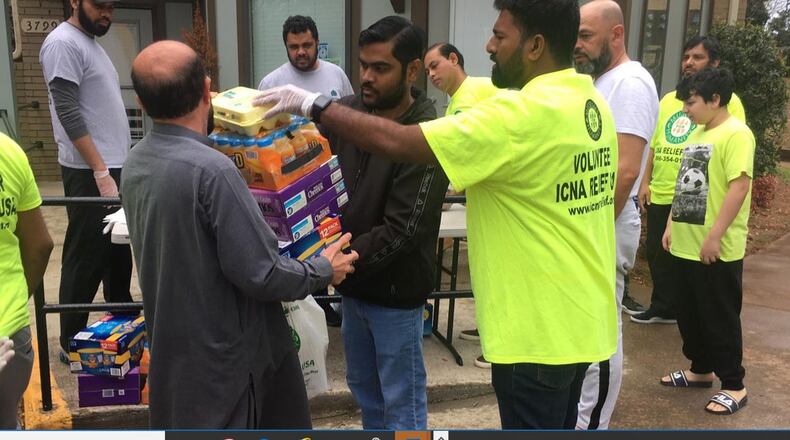Derek Stevenson thought about his 89-year-old grandmother when he heard about older people who were stuck at home because of the coronavirus and the potential risks to those over age 60.
Although his grandmother lives with an aunt in metro Atlanta, he said he would want someone to step in and help her during this crisis if she lived alone.
So Stevenson, a Navy veteran and an umpire and referee for high school and college sports, started knocking on doors at his Atlanta apartment complex, emailing and posting notices that he could go to the grocery store and run other errands for senior residents.
A few took him up on the offer.
“People are too scared to go out, and some of the older people can’t stand in line for a long period of time,” he said. “I told them, ‘I got you, no problem. We’re going to get through this together as a community.’”
As the coronavirus spreads across Georgia, more nonprofits, faith communities and individuals are stepping up to help those at greatest risk — older residents and those with compromised immune systems or underlying illnesses.
Credit: HYOSUB SHIN / AJC
Credit: HYOSUB SHIN / AJC
As a double whammy, often those people older than 60 have other health issues that make them vulnerable, such as diabetes, high blood pressure and heart and lung disease.
The Centers for Disease Control and Prevention recommends older Americans stock up on supplies and avoid crowds as much as possible, keep extra medication on hand or consider mail order. Mostly, be prepared to stay home for a prolonged period of time.
Related: Catholic and Episcopal churches move to online services
Senior citizens centers have temporarily closed. Others are open for Meals on Wheels programs. Residential facilities have asked seniors to self-isolate and have severely limited or eliminated outside visits, except from staff and some vendors. Habitat for Humanity DeKalb indefinitely suspended its home repair projects for senior citizens so older residents would not be put at risk.
AARP announced Tuesday a $250,000 donation to Meals on Wheels America to support urgently needed outreach to isolated seniors.
Meals on Wheels Atlanta CEO Charlene Crusoe-Ingram said in response to the coronavirus, the nonprofit has started delivering two weeks of meals at a time, rather than one meal several times a week.
Hands on Atlanta, which serves about 5,000 people annually through its meals program, issued an urgent call for volunteers as it ramps up meal production over the next few days.
The plan is to deliver a week’s worth of medically tailored meals to senior citizens, shut-ins and those with chronic illnesses.
“A lot of seniors are fearful,” said Matthew Pieper, executive director. “They want to stay indoors more so than usual in order to protect themselves. Some are even leery of connecting with our delivery drivers, staff and volunteers.”
He said drivers are leaving meals at the door and then calling to say the meals are there. That “safe distance” protects both the client and the driver.
He worries, though, about social isolation. Older residents’ only interaction could be with the person who delivers their meals.
He said staffers are calling clients more often than usual just to see how they are doing.
The Islamic Circle of North America, a relief organization, is rolling out a food program for older people and those with compromised immune systems.
More: Stylists worry virus could affect supply of weave, other products
The organization has partnered with more than 15 mosques in the metro area to collect and distribute nonperishable food to people who cannot safely leave their homes.
“In times like these, food is scarce,” said Sheikh Shamikh Sahadat, Southeast director for ICNA. “A lot of the shelves are empty, and that’s where we step in.”
Additionally, several mosques have Care Clubs that are being used to reach out to senior citizens and students in the community to determine and fulfill their needs, including packed lunches.
"The beautiful thing about the faith community is that we are grounded in community work and social work," said Imam Arshad Anwar of the Roswell Community Masjid. "When you have a crisis and are feeling anxious and scared, there's something about human-to-human interaction that is very powerful."
Other religious organizations are getting creative to maintain that interaction.
Stone Mountain First United Methodist Church went virtual with its worship service, Sunday school and Bible study.
Probably 75% of its 350-member congregation is over the age of 60.
As part of the new normal, every night at 7 p.m., there will be a conference call where church leaders and members can pray, share prayer requests and concerns and offer a brief devotional. The church also sends an email blast asking members if they need errands run or need other items.
More than anything, said the Rev. Ellen Shepard, senior pastor, the nightly call keeps a connection going. “We’re really a tight-knit community,” she said. “It’s nice that before you go to sleep, you can reach out and hear other voices. It gets them out in the world.”
Latest news
Stay up to date with reliable information from the AJC about the coronavirus and our community. Sign up for our special newsletter that tracks the latest news. https://myaccount.ajc.com/ajc/preference
About the Author
Keep Reading
The Latest
Featured




